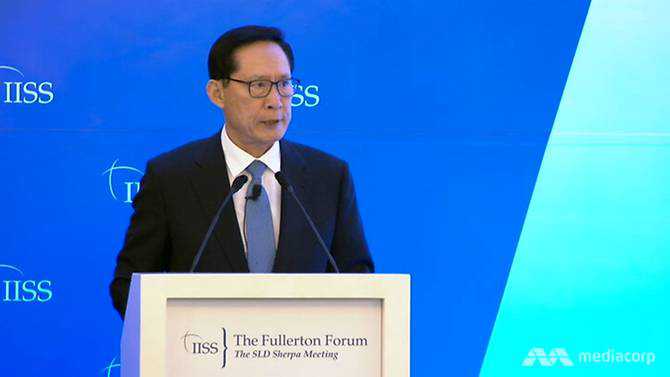North Korea's nuclear missiles 'most serious and imminent problem': S Korea minister
29 January, 2018

South Korea's Minister of National Defense Song Young-moo speaking at the International Institute for Strategic Studies Fullerton Forum.
SINGAPORE: Of all the emerging security threats the world faces, North Korea's nuclear and missile threats remains the "most serious and imminent problem" which South Korea will continue to "strongly respond" to, said South Korea's Minister of National Defense Song Young-moo.
"Despite repeated warnings and US sanctions, North Korea continues to pour its efforts and resources into developing nuclear capabilities. South Korea under no circumstance will accept North Korea as a nuclear power," said Mr Song, who delivered the keynote address at the International Institute for Strategic Studies (IISS) Fullerton Forum in Singapore on Monday (Jan 29).
Mr Song said that the South Korean government will continue to "strongly respond to North Korea's provocations" while utilising measures such as sanctions and dialogues to achieve denuclearisation of the Korean Peninsula.
He outlined the South’s efforts to overcome the security threat posed by the North, including fostering peace through defence and diplomacy, and peacefully resolving the issues at hand through dialogues and negotiations. Mr Song also reiterated that the primary aim of the implemented sanctions was not to punish the North but to bring it to dialogue.
STRENGTHENING MARITIME SECURITY COOPERATION
Highlighting the importance of Asia Pacific in global maritime trade, Mr Song said that guaranteeing the freedom of navigation in regional waters through maritime security cooperation was a "pressing matter".
"Some of the more sensitive maritime disputes in certain parts of the region are serving as excuses for projecting military power and armed races."
Mr Song also said that regional countries must "proactively implement sanctions" against North Korea, which is suspected to be smuggling in oil and other materials in international waters under the disguise of ships under foreign flags. This follows the United Nations Security Council's resolutions last year targeting its oil imports, shipping companies and foreign labour, in response to its sixth nuclear test and ballistic missile launch.
He also noted that while institutional and cultural differences among the various countries have led to cooperation "below expectations", efforts to strengthen multilateral cooperation must continue. To do so, he highlighted the importance of adhering to a rule-based international order, improving transparency based on mutual trust and respecting the sovereignty of individual countries.
"On issues that require regional security cooperation, all individual countries' opinions must be considered equally," he said. "ASEAN (Association of Southeast Asian Nations) has successfully led multilateral cooperation based on this principle."
Mr Song proposed a forum for maritime peace and order in the Northeast Asian waters involving the navies from South Korea, US, Japan, China and Russia.
Known as the IISS Shangri-La Dialogue Sherpa Meeting, the IISS Fullerton Forum is a platform for defence and military officials and non-governmental experts to discuss key regional security issues, with around 75 delegates from over 20 countries participating in the event.
TAG(s):
